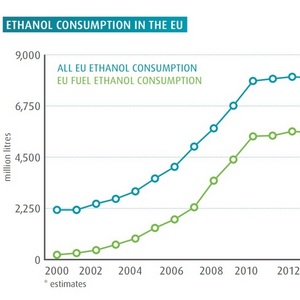ePURE calls for better EU policy in State of the Industry Report

ePURE
June 20, 2014
BY Erin Krueger
The European renewable ethanol industry association, ePURE, recently published its first ever State of the Industry Report. In addition to providing a comprehensive overview of the European ethanol industry, the report advocates for the role ethanol can play in meeting fundamental challenges faced by European nations.
“Having only begun in earnest in 2003 – long after our biggest competitor markets in U.S. and Brazil – we have already made a significant contribution to creating jobs, particularly high skilled and rural, and supporting growth and European innovation,” wrote Rob Vierhout, secretary general of ePURE, in a forward to the report. “We have also made a significant contribution to the fight against climate change through the replacement of fossil fuels with renewable energy produced with non-food feedstock sourced 93 percent from Europe.”
Although the European ethanol sector has matured quickly, Vierhout stressed it is still in its infancy. “We are nowhere near to realizing its potential,” he wrote. “It can and should play an even more important role in reversing rising [greenhouse gas (GHG)] emissions in the European transport sector, bringing additional income and development to Europe’s rural communities, turning European technology and innovation into more green jobs, and reducing Europe’s energy dependence. Our bio-refineries and the renewable ethanol they produce are essential components of the emerging bio-based economy.”
Advertisement
According to Vierhout, in order for the European ethanol sector to realize its full potential, the European Union has to enact a more supportive policy framework that creates a level playing field and better nurtures the industry. This will only happen, he wrote, if the industry and its stakeholders work together to increase awareness and understating of the European ethanol industry.
The European Union is currently the world’s third top producer of ethanol, behind the U.S. and Brazil. According to the report, Europe produces an estimated 6.7 billion liters (1.77 billion gallons) of ethanol per year. In comparison, the U.S. produces and consumes approximately 50 billion liters annually, followed by Brazil, which produces approximately 23 billion liters each year.
According to the report, the European Union was home to approximately 8.8 billion liters of ethanol production capacity last year, with 7 billion liters dedicated to fuel ethanol produciton. Actual production, however, was approximately 6.7 billion liters, with consumption reaching about 7.9 billion liters. The European Union imported an estimated 1.2 billion liters of ethanol and exported only 100 million liters. Imports accounted for approximately 15.2 percent of consumption in 2013.France has the most ethanol capacity in the European Union, followed by Germany, the U.K, Poland and Spain.
Advertisement
Regarding the development of advanced and cellulosic biofuels, the report calls for the European Union to set specific mandates to stimulate innovation in capital-intensive advanced ethanol technologies. The report indicates that a mandate, combined with a longer-term perspective of the European Union’s climate policy and meaningful financial support for upfront investments, would provide investors and innovators with clarity and a predictable market. While a commercial-scale cellulosic ethanol plant opened in Italy last year and several pilot and demonstration facilities are operational, the report notes that there are presently no other prospects for commercial-scale cellulosic ethanol in Europe. Several plants, however, are under development in the U.S. and Brazil. “This means that while European companies are world leaders in advanced and innovative biofuel technologies, investments are increasingly being made outside the E.U., where conditions are more favorable,” said ePURE in the report. “The E.U. needs to urgently help ventures move from [research and development] to the commercial deployment of advanced biofuels to avoid this ‘innovation leakage.’”
A full copy of the report, which also addresses land use change, food prices, and several other issues, can be downloaded from the ePURE website.
Related Stories
CARB on June 27 announced amendments to the state’s LCFS regulations will take effect beginning on July 1. The amended regulations were approved by the agency in November 2024, but implementation was delayed due to regulatory clarity issues.
SAF Magazine and the Commercial Aviation Alternative Fuels Initiative announced the preliminary agenda for the North American SAF Conference and Expo, being held Sept. 22-24 at the Minneapolis Convention Center in Minneapolis, Minnesota.
Saipem has been awarded an EPC contract by Enilive for the expansion of the company’s biorefinery in Porto Marghera, near Venice. The project will boost total nameplate capacity and enable the production of SAF.
Global digital shipbuilder Incat Crowther announced on June 11 the company has been commissioned by Los Angeles operator Catalina Express to design a new low-emission, renewable diesel-powered passenger ferry.
International Air Transport Association has announced the release of the Sustainable Aviation Fuel (SAF) Matchmaker platform, to facilitate SAF procurement between airlines and SAF producers by matching requests for SAF supply with offers.
Upcoming Events










